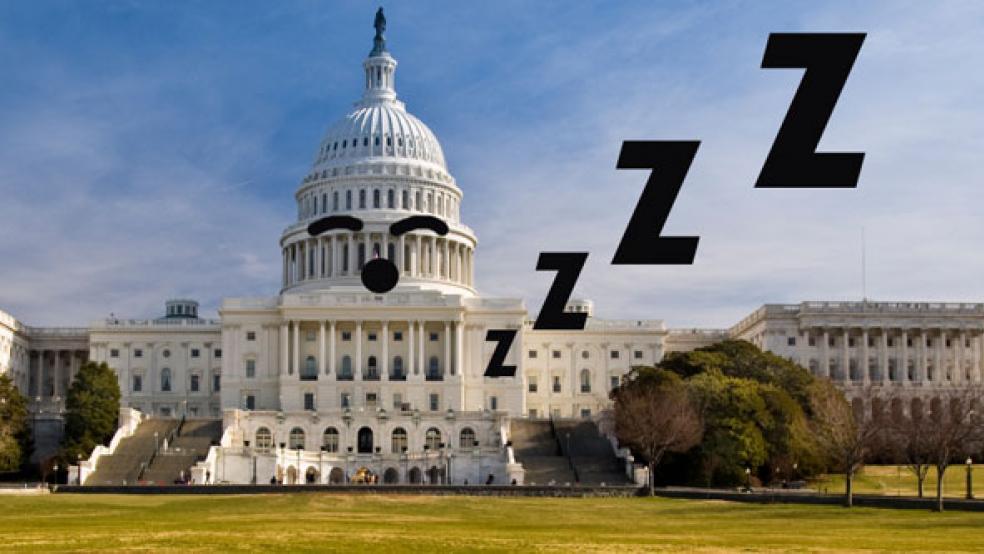Although the new Republican-dominated Congress can point to a number of bipartisan successes – including new fast-track Pacific Rim trade legislation and a long-overdue revision to Medicare’s reimbursement policies for doctors – a shocking array of must-pass fiscal and budget legislation will remain while lawmakers celebrate the month-long August holiday.
“Congress is not getting its job done because it’s too polarized and its ordinary processes have broken down,” said Alice Rivlin, a former director of the Congressional Budget Office and a senior economist at the Brookings Institution. “There have been lots of promises [of an improved legislative system] but it’s not happening. It’s very discouraging.”
Related: A Revolutionary Budget Proposal for Congress: Do Your Work on Time!
The list of crucial unfinished business as the summer recess begins later this week is remarkably long and weighty:
- About $1.1 trillion of discretionary spending bills critical to operating the government in the coming year are trapped in a dispute between GOP leaders and President Obama over new spending levels. At issue is whether to lift tight spending caps on both domestic and defense programs, as Obama is demanding, or only lift them for defense programs, as the Republicans insist.
- The House and Senate have feuded for weeks over new legislation to fund highway and bridge construction and other infrastructure projects. Senate Majority Leader Mitch McConnell (R-KY) has pressed for nearly $50 billion of new spending over the next three years while House leaders prefer just a three-month extension while they explore alternatives for paying for longer-term legislation.
- Congress allowed the charter of the U.S. Export-Impact Bank to expire June 30 – a decision that abruptly called a halt to all new loan guarantees to foreign customers of U.S.-exported goods. The House and Senate are at odds over whether to renew the bank’s authorization and, if so, how to go about doing it.
- The federal government is bumping up against the $18.1 trillion federal debt ceiling, and the Treasury could once again face the threat of default on its borrowing later this year unless Congress steps in. Beginning in March, Treasury Secretary Jack Lew began imposing “extraordinary measures” on Treasury borrowing to forestall the day of reckoning.
In dealing with the most pressing fiscal matters – including the fiscal 2016 spending bills and the highway and transportation legislation – GOP leaders will likely resort to the time-tested strategy of kicking the can down the road.
Related: Congress Uses Accounting Gimmicks to Fund Highway Bill
House Speaker John Boehner (R-OH) said last week that Congress would have no choice but to pass a massive, short-term continuing resolution this fall to keep the federal government operating beyond Oct. 30, until lawmakers and the White House can reach an accommodation for next year’s spending levels. That means that federal departments and agencies will be required to operate at fiscal 2015 spending levels and policies, essentially undoing months of hard work and deliberation by House and Senate appropriators.
Meanwhile, McConnell and other GOP leaders signaled Tuesday that the Senate will go along with the House demand for a three-month extension of highway spending through Oct. 29, according to Roll Call. The House may also pass a long-term highway spending bill to have on hand when the two chambers go to conference this fall to try to iron out differences.
One of the ironies of the latest congressional stalemate is that little more than seven months after taking control of Congress, House and Senate Republicans have been at each other’s throats.
On the transportation spending controversy, for example, McConnell teamed up with Democratic Sen. Barbara Boxer of California to draft major long-term highway spending legislation last week and then tried to force it on House Republicans before the recess to put a stop to seemingly endless extensions of the old highway law. Boehner and House conservatives balked and McConnell and other Senate GOP leaders had to give in.
Related: The Next Debt Crisis Could Be Much Worse than in 2013, GAO Warns
The Export-Import Bank reauthorization has been another source of tension between the two chambers. While a clear majority of House and Senate members favor renewing the bank’s charter, the GOP leadership in both chambers is divided over the issue. For now there doesn’t appear to be an easy pathway to passage, especially with many conservative groups like Club for Growth and the Heritage Foundation political action committee working against it.
Senate Minority Leader Harry Reid (D-NV) and House Minority Leader Nancy Pelosi (D-CA) have been highly critical of the GOP’s performance thus far and frequently cluck over McConnell’s and Boehner’s inability to control their troops. But many Democrats are simply standing back and enjoying the political fireworks on the Republican side.





